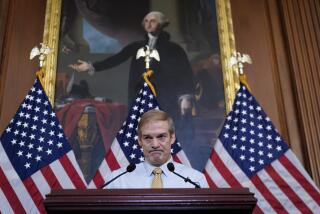What’s God got to do with it?
The House voted 396-9 this week to reaffirm as the national motto the phrase “In God We Trust” and encouraged its pronouncement on public buildings and continued printing on the coin of the realm. The motto was made official in 1956 during the height of Cold War hysteria over godless communism and — in the words of Brig. Gen. Jack D. Ripper in “Dr. Strangelove” — “Communist infiltration, Communist indoctrination, Communist subversion and the international Communist conspiracy to sap and impurify all of our precious bodily fluids.”
As risible a reason as this was for knocking out a few bricks in the wall separating state and church, it was at least understandable in the context of the times. But today, what is the point of having this motto? There are no communist threats, and belief in God or a universal spirit among Americans is still holding strong at about 90%, according to a 2011 Gallup Poll. The answer is in the wording of the resolution voted on: “Whereas if religion and morality are taken out of the marketplace of ideas, the very freedom on which the United States was founded cannot be secured.”
What is troubling — and should trouble any enlightened citizen of a modern nation such as ours — is the implication that in this age of science and technology, computers and cyberspace, and liberal democracies securing rights and freedoms for oppressed peoples all over the globe, that anyone could still hold to the belief that religion has a monopoly on morality and that the foundation of trust is based on engraving four words on brick and paper.
If you think that God is watching over the U.S., please ask yourself why he glanced away during 9/11 or why he chose to abandon the good folks of New Orleans during Hurricane Katrina, and why he continues to allow earthquakes and cancers to strike down even blameless children. The problem of evil — why bad things happen to good people if an all-powerful and all-good God is in control of things — has haunted the faithful since it was first articulated millenniums ago, with nigh a solution on the horizon.
It’s time to drop the God talk and face reality with a steely-eyed visage of the modern understanding of the origin of freedom on which the United States was founded and continues to be secured. God has nothing to do with it. If you want freedom and security, you need the following:
The rule of law; property rights; a secure and trustworthy banking and monetary system; economic stability; a reliable infrastructure and the freedom to move about the country; freedom of the press; freedom of association; education for the masses; protection of civil liberties; a clean and safe environment; a robust military for protection of our liberties from attacks by other states; a potent police force for protection of our freedoms from attacks by people within the state; a viable legislative system for establishing fair and just laws; and an effective judicial system for the equitable enforcement of those fair and just laws.
With these in place the citizens of a nation feel free and secure. Why? The answer is in the final word of the motto: Trust. Claremont Graduate University economist Paul Zak has studied trust among nations and found that the more of these components that are in place, the more citizens trust one another. Zak even computed the differences in living standards that trust can affect, demonstrating that a 15% increase in the proportion of people in a country who think others are trustworthy raises income per person by 1% per year for every year thereafter. For example, increasing levels of trust in the U.S. from its current 36% to 51% would raise the average income for every man, woman and child in the country by $400 per year. Trust pays.
Trust has fiscal benefits that are derived through specific political and economic policies that have nothing whatsoever to do with religion or belief in God. Despite a strong faith in God, the percentage of Americans who believe that “religion can answer all or most of today’s problems” has plummeted from 82% to 58%, while those who believe that “religion is old-fashioned and out of date” leaped from 7% to 28%, according to a 2010 Gallup Poll. Thus it would seem that Americans are more aware today than half a century ago that it’s up to us to secure our freedom through enlightened secular policies with practical social applications rather than faith-based hope in empty mottoes reflecting an era gone by.
Michael Shermer is the publisher of Skeptic magazine, a monthly columnist for Scientific American and an adjunct professor at Chapman University and Claremont Graduate University. His latest book is “The Believing Brain.”
More to Read
A cure for the common opinion
Get thought-provoking perspectives with our weekly newsletter.
You may occasionally receive promotional content from the Los Angeles Times.










